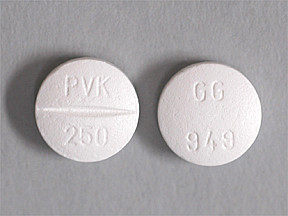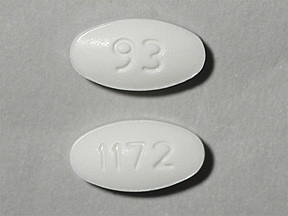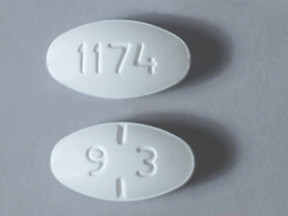PENICILLIN V POTASSIUM - ORAL
PHONETIC PRONUNCIATION: (pen-ih-SILL-in VEE poh-TASS-ee-um)
COMMON BRAND NAME(S): Pen-Vee K, V-Cillin K, Veetids
GENERIC NAME(S): penicillin V potassium
Uses
USES: Penicillin is an antibiotic used to treat and prevent a wide variety of bacterial infections. It works by stopping the growth of bacteria. This antibiotic treats and prevents only bacterial infections. It will not work for virus infections (such as the common cold, flu). Using any antibiotic when it is not needed can cause it to not work for future infections.
How to use PENICILLIN V POTASSIUM - ORAL
HOW TO USE: Take this medication by mouth as directed by your doctor. This medication may be taken with or without food. However, penicillin is best absorbed when taken on an empty stomach (1 hour before or 2 hours after meals). The dosage is based on your medical condition and response to treatment. For the best effect, take this antibiotic at evenly spaced times. To help you remember, take this medication at the same time(s) every day. Continue to take this medication until the full prescribed amount is finished, even if symptoms disappear after a few days. Stopping the medication too early may allow bacteria to continue to grow, which may result in a return of the infection. Tell your doctor if your condition persists or worsens.
Side Effects
Precautions
Interactions
Overdose
Images

- color
- off-white
- shape
- round
- imprint
- PVK 250, GG 949
Reviews
Faq for PENICILLIN V POTASSIUM - ORAL
- Penicillin V potassium is primarily used to treat bacterial infections such as strep throat, tonsillitis, and skin infections.
- Penicillin V potassium works by inhibiting the growth and reproduction of bacteria, ultimately leading to the elimination of the infection.
- Penicillin V potassium is generally considered safe to use during pregnancy, but it is always best to consult with a healthcare provider before taking any medication.
- Common side effects of penicillin V potassium may include upset stomach, diarrhea, nausea, vomiting, and rash. If any severe or persistent side effects occur, it is advised to contact a doctor.
- Penicillin V potassium should be taken exactly as prescribed by a healthcare professional. It is typically taken with a full glass of water, on an empty stomach, at evenly spaced intervals.
- No, penicillin V potassium is only effective against bacterial infections and cannot be used to treat viral infections such as the common cold or flu.
- If a dose of penicillin V potassium is missed, it should be taken as soon as remembered. However, if it is close to the time for the next dose, it is advisable to skip the missed dose and continue with the regular dosing schedule.
- Yes, penicillin V potassium can interact with certain medications, including oral contraceptives, blood thinners, and some antacids. It is important to inform a healthcare provider about all medications being taken to check for potential interactions.
- Improvement in symptoms is typically noticed within a few days of starting penicillin V potassium treatment. However, it is crucial to complete the full course of antibiotics prescribed, even if symptoms improve earlier.
Disclaimer
IMPORTANT: HOW TO USE THIS INFORMATION: This is a summary and does NOT have all possible information about this product. This information does not assure that this product is safe, effective, or appropriate for you. This information is not individual medical advice and does not substitute for the advice of your health care professional. Always ask your health care professional for complete information about this product and your specific health needs.



No Reviews Yet